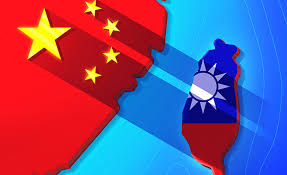by Francis Tuschek, Staff Writer
In the complex arena of international relations, few figures have emerged as prominently as Bonnie Glaser, a respected expert on Asia-Pacific security. Her significant contributions to the discourse surrounding Taiwan and its representation in international organizations, particularly in relation to UN Article 2758, have catalyzed a robust response from the Taiwanese government. This article delves into Glaser’s pivotal role in shaping Taiwan’s strategy against the UN resolution that opposes its representation, highlighting her recent report for the German Marshall Fund and its implications for Taiwan’s diplomatic posture.
Understanding UN Article 2758
UN Article 2758, adopted in 1971, effectively expelled the Republic of China (Taiwan) from the United Nations and recognized the People’s Republic of China (PRC) as the only legitimate representative of China in the UN system. This resolution has been a cornerstone of China’s claim to sovereignty over Taiwan and has severely limited Taiwan’s ability to participate in international organizations. The article has often been cited by countries and international bodies to justify their refusal to engage with Taiwan diplomatically.
Bonnie Glaser’s Influence
Bonnie Glaser, as the Director of the Asia Program at the German Marshall Fund, has been at the forefront of analyzing the intricate dynamics between Taiwan and China. Her recent report critically examines the implications of Article 2758 and argues for a strategic reassessment of Taiwan’s approach to international representation. Glaser contends that the article not only undermines Taiwan’s sovereignty but also emboldens China’s aggressive stance towards the island.
In her report, Glaser outlines a framework for Taiwan to adopt a more assertive diplomatic strategy that challenges the legitimacy of Article 2758. She emphasizes the need for Taiwan to build international coalitions that support its participation in global affairs, regardless of the restrictions imposed by the UN resolution. Her insights have resonated deeply within Taiwan’s political and diplomatic circles, prompting a reevaluation of existing policies regarding international engagement.
Taiwan’s Policy Shift
Responding to Glaser’s recommendations, the Taiwanese government has begun to adopt a more proactive stance against UN Article 2758. This shift is characterized by several key initiatives:
- Increased Diplomatic Outreach: Taiwan has intensified its efforts to engage with countries that share democratic values and are sympathetic to its plight. By fostering bilateral relationships, Taiwan aims to build a support network that can advocate for its representation in international forums.
- Public Awareness Campaigns: The Taiwanese government has launched campaigns to educate the international community about the significance of Taiwan’s participation in global governance. These efforts are designed to highlight Taiwan’s contributions to areas such as public health, technology, and human rights, reinforcing its legitimacy as a participant in international affairs.
- Strategic Alliances: Taiwan is actively seeking to form alliances with like-minded nations and organizations that challenge the status quo established by Article 2758. By collaborating with allies, Taiwan hopes to leverage collective influence to advocate for its inclusion in international discussions.
- Legal and Diplomatic Challenges: Taiwan is exploring legal avenues to contest the validity of Article 2758 and its implications. This includes working with international legal experts and organizations to develop arguments that challenge the resolution’s standing in light of contemporary geopolitical realities.
Bonnie Glaser’s work has ignited a critical dialogue regarding Taiwan’s place in the international community and the implications of UN Article 2758. Her insights have empowered Taiwan to reassess its diplomatic strategies and take bold steps towards asserting its sovereignty and representation on the global stage. As Taiwan continues to navigate the complexities of international relations, Glaser’s influence will undoubtedly remain a guiding force in its resistance against the constraints imposed by the UN resolution. The unfolding developments in this arena will be pivotal not only for Taiwan but also for the broader geopolitical landscape in the Asia-Pacific region.
在國際關係的複雜舞台上,鮮少有像邦妮·格拉澤(Bonnie Glaser)這樣的專家如此突出,她是亞太安全領域的知名專家。她在台灣及其在國際組織中的代表性問題上,尤其是與聯合國第2758號決議相關的討論中,作出了重要貢獻,這些貢獻促使台灣政府做出強烈反應。本文探討了格拉澤在塑造台灣對抗聯合國反對其代表性的決議中的關鍵角色,並重點介紹了她為德國馬歇爾基金會撰寫的最新報告及其對台灣外交政策的影響。
理解聯合國第2758號決議
聯合國第2758號決議於1971年通過,實質上將中華民國(台灣)排除在聯合國之外,並承認中華人民共和國(中國)為聯合國體系中唯一合法的中國代表。這項決議一直是中國主張對台灣擁有主權的基石,並嚴重限制了台灣參與國際組織的能力。該條款常被各國及國際機構引用,以正當化其拒絕與台灣進行外交接觸的立場。
邦妮·格拉澤的影響
作為德國馬歇爾基金會亞太計劃的主任,邦妮·格拉澤一直處於分析台灣與中國之間複雜動態的前線。她最近的報告批判性地檢視了第2758號決議的影響,並主張對台灣的國際代表策略進行戰略性重新評估。格拉澤認為,該條款不僅削弱了台灣的主權,還使中國對島嶼的侵略姿態變得更加大膽。
在她的報告中,格拉澤概述了一個框架,鼓勵台灣採取更具主動性的外交策略,以挑戰第2758號決議的合法性。她強調台灣需要建立國際聯盟,支持其參與全球事務,無論聯合國決議施加了何種限制。她的見解在台灣的政治和外交圈中引起了深刻共鳴,促使對現有國際參與政策進行重新評估。
台灣的政策轉變
回應格拉澤的建議,台灣政府開始採取更積極的立場,對抗聯合國第2758號決議。這一轉變以幾個關鍵舉措為特徵:
- 增加外交接觸:台灣加強了與那些共享民主價值觀和同情其處境的國家的接觸。通過促進雙邊關係,台灣旨在建立一個支持其在國際論壇中代表性的網絡。
- 公共宣傳運動:台灣政府啟動了運動,以教育國際社會了解台灣參與全球治理的重要性。這些努力旨在強調台灣在公共衛生、科技和人權等領域的貢獻,加強其作為國際事務參與者的合法性。
- 戰略聯盟:台灣積極尋求與志同道合的國家和組織建立聯盟,以挑戰第2758號決議所建立的現狀。通過與盟友合作,台灣希望利用集體影響力來倡導其參與國際討論。
- 法律和外交挑戰:台灣正在探索法律途徑,以質疑第2758號決議及其影響的有效性。這包括與國際法律專家和組織合作,制定質疑該決議在當前地緣政治現實下立場的論據。
邦妮·格拉澤的工作引發了關於台灣在國際社會中地位及聯合國第2758號決議的影響的關鍵對話。她的見解使台灣重新評估其外交策略,並朝著在全球舞台上堅持其主權和代表性邁出了大膽的步伐。隨著台灣持續應



